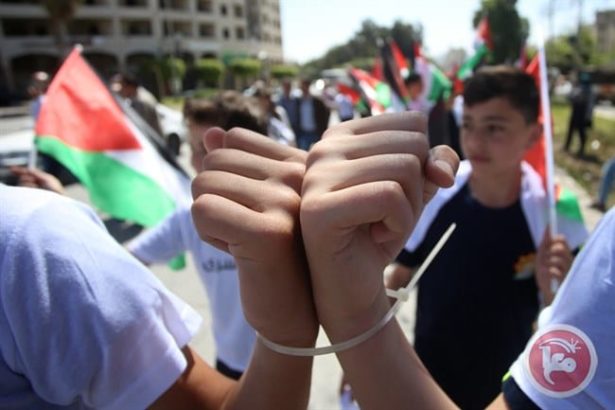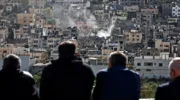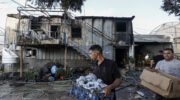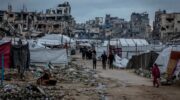BETHLEHEM (Ma’an) — A day after hundreds of Palestinians held in Israeli prisons suspended a 40-day mass hunger strike, more details emerged on Sunday regarding the outcome of negotiations between hunger strikers and the Israel Prison Service (IPS), with a Palestinian Committee of Prisoners Affairs official saying that 80 percent of the strike’s demands were met, though an IPS spokesperson denied the claim.
After the strike ended in the early hours on Saturday following 20 hours of negotiations, Palestinian officials did not immediately reveal details regarding the achievements of the hunger strike. An IPS spokesperson only confirmed that family visitation sessions were restored to two times a month, adding that IPS was not considering the talks “negotiations,” as they only reinstated a previous policy and did not provide any new concessions to the prisoners.
On Sunday, head of the Palestinian Committee of Prisoners’ Affairs Issa Qaraqe said in a statement that 80 percent of the hunger strikers’ demands were met according to the agreement reached after negotiations between IPS and representatives of hunger strikers led by imprisoned Fatah official Marwan Barghouthi.
Qaraqe described the outcome of the hunger strike as “a fundamental transformation in the terms of the prisoners’ living conditions.”However, IPS spokesperson Hana Herbst told Ma’an that “contrary to the reports delivered by Issa Qaraqe, no benefits were given to national security prisoners in return to quitting the hunger strike and there were no negotiations on this matter.”
Herbst reiterated IPS’s stance that the suspension of the hunger strike “was made possible due to the National Palestinian Authority agreeing to fund the second visit instead of the Red Cross who up to a few months ago was the funding organization,” and not due negotiations between hunger-striking prisoners and IPS. The spokesperson did not comment on reports from Qaraqe that said a mechanism was also established for further negotiations, to continue discussions on agreements that were so far made only “in principle,” and regarding the original demands of the strike that were not met at all.
A committee consisting of prisoners Karim Yunis, Nasser Abu Hmeid, Hafith Sharayaa, Nasser Uweis, Ammar Mardi, and Ahmad Barghouthi will continue such talks with IPS, according to Qaraqe.Qaraqe also highlighted in his statement that the Fatah movement appointed Karim Yunis, the longest-serving Palestinian prisoner, as a member of Fatah’s Central Committee, describing that appointment as “a major political achievement of the hunger strike,” for defying Israel’s designation of Palestinian prisoners as terrorists rather than political detainees.
According to committee lawyer Karim Ajweh, who met with hunger-striking prisoner Nasser Abu Hmeid — a member of the team who negotiated the agreement at Ashkelon prison Friday night — the major terms agreed upon were listed as follows:
- Expanding access to public telephones in order to communicate with family members, in accordance with agreed-upon mechanisms, with continuation of dialogue on this issue as a priority for detainees in all prisons.
- An agreement was reached on a number of issues related to family visitations, including lifting the security ban imposed by Israel on hundreds of prisoners’ family members, including 140 children. According to prisoners’ solidarity network Samidoun, the agreement would also end the practice of returning visitors holding permits and refusing their visits at checkpoints.
- The Israelis agreed “in principle” to allow Palestinians the besieged Gaza Strip to visit their imprisoned relatives once every month instead of once every two months.
- An agreement was reached “in principle” to a number of improvements regarding the conditions of family visits, such as allowing the entry of clothes and candy.
- New criteria will be introduced to allow visits from second degree relatives — such as nephews and nieces. Prisoners whose fathers and mothers are deceased may also add one or two additional distant family members to their visitation list, Samidoun said.
- The Israelis officially agreed to resume a second family visit every month, as was agreed by the Palestinian Authority (PA) — who will fund the second visits, and the International Committee of the Red Cross (ICRC) — who used to fund both visits until the organization decided last year to only facilitate one monthly visit.
- An agreement was reached to return ill prisoners to the newly refurbished Ramla prison hospital.
- An agreement was reached to gather all female Palestinian prisoners in HaSharon prison. Arrangements will also be made for visits from their husbands and children. In addition, female prisoners will be allowed to receive materials for handicrafts, and a special system will be introduced for their transportation from prison to courts.
- An agreement was reached to improve the living conditions for imprisoned minors and their transportation from prisons to courts. Samidoun said the agreement also included child prisoners’ access to education and other related issues.
- “The majority” of unresolved issues regarding improving living conditions at Nafha prison were resolved.
- An agreement was reached to transfer ill prisoners currently held in the Ramla prison clinic to the newly refurbished section at Ramla noted above, under adequate and humanitarian living conditions. A new system was also put into effect to directly transport the ill prisoners between prison and court without transiting through lengthy crossing points.
- Prisoners in transit will also receive meals and be allowed use the toilet during transfers.
- An agreement was reached to have an appropriate kitchen area established in every prison ward, to be equipped with cooking equipment, instead of having a cooking corner in every prison cell.
- Prisoners will be allowed to take photos with their spouses during visits. Photos with siblings will also be permitted — but only if one of their parents is dead.
- The system of the prison’s commissary will be amended “substantially,” in terms of the prices and quality of goods, while spices and some vegetables such as mulukhiyya will be allowed.
- Modern sports equipment will be installed in prison recreation yards.
- The issue of overcrowding, as well as issues related to temperatures, ventilation, and cooling will be resolved.
- Ambulances equipped as intensive care units, to transfer prisoners in urgent health emergencies, will be stationed outside Ktziot prison, Ramon prison, and Nafha prison, due to their remote locations away from hospitals in Israel’s southern Negev region.
- According to the agreement, prisoners should be transferred to prisons as close as possible to their families’ places of residence. However, Israel’s detention of Palestinians contravenes the Fourth Geneva Convention, which prohibits the transfer of prisoners outside of occupied territory, which can result in family members being denied access to their detained relative.
Report from Ma’an News.





